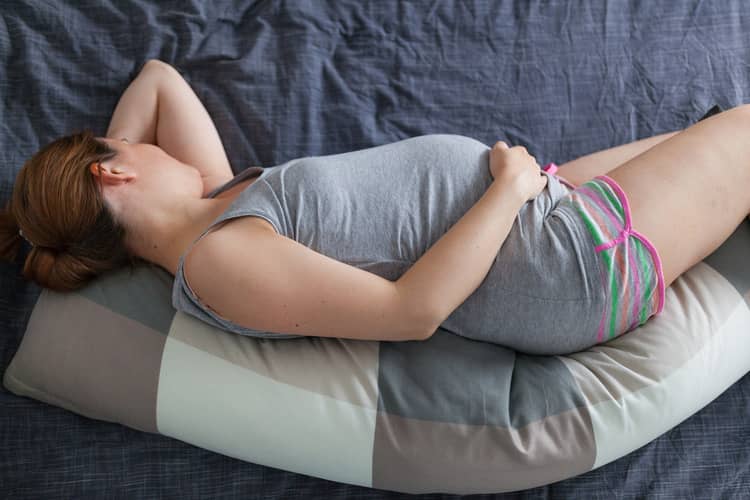
Insomnia during pregnancy - causes, experiences and advice on how to fall asleep
Pregnancy insomnia or insomnia in women during pregnancy indicates a problem with sleep. Insomnia is caused by factors related to pregnancy symptoms. For some women, sleep problems are more pronounced, while other women encounter them only mildly and last temporarily. However, sleep disorders during pregnancy are not uncommon. This is also confirmed by an old survey from 1998 (American National Foundation for Women and Sleep), according to which up to 78% of women stated that they have or had sleep problems during pregnancy. Today, that number is not expected to be much different. Why is waking up at night during pregnancy a problem? When does insomnia appear in pregnancy? How to fall asleep during pregnancy and what helps you sleep peacefully?
- What is pregnancy insomnia?
- The most common reasons for insomnia during pregnancy
- Risks of insufficient sleep in pregnancy
- The importance of quality sleep
- Insomnia in the first trimester
- Insomnia in the second and third trimester
- Advice and recommendations on how to fall asleep during pregnancy
- Insomnia in pregnancy - experiences
- The most frequent questions - FAQ
- Comments
Quality and sufficient sleep is often emphasized as one of the most important human needs. This applies several times during pregnancy. Difficulty falling asleep or frequent waking up at night during pregnancy, however, is a complication that prevents quality sleep. The consequences of insomnia cause fatigue, irritability, moodiness, nervousness or even depressive moods. They can affect the course of pregnancy and the health of the fetus and the woman. The amount of sleep that a pregnant woman's body needs for optimal regeneration is very individual, and in pregnancy this aspect affects the course and stage of pregnancy. Does insomnia appear in the 1st, 2nd or even 3rd trimester of pregnancy? What causes insomnia in pregnancy?
What is pregnancy insomnia?
Women during pregnancy usually suffer from sleep problems, so this is not an exceptional condition. Pregnancy is a beautiful and at the same time challenging period for a woman, which brings with it many changes. They subsequently affect the entire life cycle of a woman. Insomnia during pregnancy means that a woman has trouble falling asleep or has a significant lack of sleep. In connection with pregnancy, it is also waking up at night and interrupted sleep, which is caused by the symptoms of pregnancy. Women who are pregnant for the first time can experience insomnia and its symptoms more intensely.
Poor sleep during pregnancy is caused by a combination of several factors that are typical for individual stages of pregnancy and we will describe them in more detail in the chapters below. Primarily, however, pregnancy insomnia differs from classic insomnia by the fact that significant hormonal changes occur in women at this stage of the life cycle. Some women experience a significant sleep deficit, while others experience these problems only to a lesser extent and do not perceive it as a problem. Insomnia during pregnancy can also be caused by accompanying diseases. The causes of insomnia in pregnancy are often undetermined. Sometimes it is a short-term issue, other women encounter insomnia during the entire pregnancy.

The most common reasons for insomnia during pregnancy
- Hormonal changes (mainly the action of progesterone)
- Nausea of pregnancy
- Frequent urination at night
- Heartburn
- Increased heart rate (hot flushes, more difficult breathing)
- Digestive difficulties
- Physical discomfort (growing belly, cramps, leg swelling )
- Incorrect sleeping position
- Psychological discomfort (anxiety, fear, stress)
- Caffeine intake (even a small amount)
Risks of insufficient sleep in pregnancy
A sleep disorder can include mood swings, anxiety or breathing problems. Some sources also point to an increased risk of premature birth, outbreak of gestational diabetes or preeclampsia. These cases occur if it is a more serious form of insomnia or insomnia. Excessive fatigue during the day can cause restlessness, nervousness, irritability, depressive moods, anxiety, obsessive-compulsive disorders, and this leads to further deterioration of sleep quality. Subsequently, such conditions can lead to postpartum depression.
In addition to insomnia, problems related to sleep during pregnancy are also associated with sleep apnea (note: a sleep disorder that is characterized by breathing stops in several episodes that cause awakening), gastroesophageal reflux (note: a condition where stomach acids return to the esophagus and cause its irritation - heartburn), chronic back pain or with RLS - restless legs syndrome.

The importance of quality sleep
It is necessary to realize that sleep is not a luxury activity, but an integral part of a healthy pregnancy. It represents a key factor for the health of the mother and the fetus. Sleep generally serves to regenerate the entire organism. Not only physically, but also mentally. During pregnancy, quality sleep is all the more important for a woman, as the body uses energy for two. A pregnant woman gains energy during sleep and also leaves time for the rest phase of the organism and the locomotor apparatus. During sleep, blood pressure decreases and muscles and organs rest.
The quality of sleep affects other necessary processes and activities that the expectant mother performs. A pregnant woman must try to maintain her psychological well-being first and foremost. Concerns and fear of the consequences of sleepless nights can harm a woman and her sleep even more than the sleepless nights themselves.
Insomnia in the first trimester
During the first trimester, insomnia is primarily caused by hormonal activity and the onset of pregnancy symptoms. It is primarily a rise in the level of the hormone progesterone. The latter is necessary in itself, because it participates in the cessation of menstruation and also helps the development of the mammary glands of the breasts. In addition, progesterone also affects women's sleep in early pregnancy. It causes fatigue, and research has shown that this hormone reduces the proportion of non-REM sleep and REM sleep, resulting in lower sleep efficiency. These changes in the phases of sleep can also negatively affect its later quality.
Insomnia in the 1st trimester is mainly due to typical symptoms of pregnancy – pregnancy nausea, vomiting, diarrhea, bloating, pain in the lower abdomen (uterine growth) and in the lower back area, painful breasts, hot flushes, shortness of breath. Early symptoms of pregnancy that can disrupt sleep include headaches and frequent urination. Paradoxically, excessive fatigue is one of the main symptoms of the first trimester of pregnancy. It is also said that insomnia during pregnancy can be caused by strange dreams from the beginning, which do not let the subconscious mind rest completely.

Insomnia in the second and third trimester
The second trimester of pregnancy is known, relatively, as a resting phase. In the sense that there are no such rapid hormonal fluctuations, or their level normalizes. During the second trimester, the abdomen does not yet represent such a significant obstacle. In most women, the intensity of many pregnancy symptoms also subsides. The majority of surveys also show that insomnia in the 2nd trimester is very infrequent and does not have a persistent nature. Of course, the nature of each pregnancy is different, and problems with insomnia can also appear during this period. However, it is more often related to psychological discomfort.
The third trimester is considered the most critical in terms of sleep quality. The research shows that approximately 98% of women state that in their case it occurs or nocturnal awakening occurred in the third trimester. The reason is that the deep phase of non-REM and REM sleep is reduced. Unlike the first trimester, when hormones and the first signs of pregnancy played a role, insomnia in the 3rd trimester is caused primarily by the general discomfort of the pregnant woman. Research has not shown any changes related to melatonin levels. It is this hormone that signals the body's state of sleep and wakefulness. During sleep, its level peaks, on the contrary, it decreases towards the end. Even during pregnancy, melatonin maintains the balance of the day and night cycle.
In the third trimester, insomnia during pregnancy is caused, for example, by a large belly, which limits a woman's ability to find a comfortable sleeping position. Nighttime awakenings to urinate frequently are also more intense. The reason is the growing uterus, the growing fetus and its movements. This increases the pressure on the bladder and this affects the need to urinate more often. The pressure of the uterus is responsible for difficult breathing. Waking up from sleep is so common. Cramps in the legs, swelling of the limbs, sensitive breasts, stomach problems, heartburn or back pain are also responsible for insomnia or sleep disorders.
Advice and recommendations on how to fall asleep during pregnancy
It is obvious that insomnia during pregnancy is not unusual, on the contrary, statistics clearly point to the fact that it is a frequent manifestation during pregnancy. Of course, there is a difference if these are partial sleep disorders or sleep problems develop into pregnancy insomnia. If a pregnant woman has sleep problems, she can apply several proven procedures that can have a positive effect on her sleep regime. Here are some tips and recommendations that may help in your case as well. Consult your doctor in case of severe insomnia.

Side sleeping position
Pregnant women are recommended to sleep on their side from the beginning of pregnancy, ideally on the left side. In this position, the pressure on the bladder is reduced and at the same time a better circulation of nutrients from the placenta to the fetus is ensured. It is definitely not recommended to sleep on your back or stomach. It is also appropriate to put a quilt or pillow between your knees when lying on your side. You can relieve back pain by supporting your knees. Sometimes a bad bed or an unsuitable mattress can also be to blame.
Don't worry, don't stress and breathe
Can't fall asleep in bed? Do you fall asleep and wake up? Keep calm. If you can't fall asleep at night, don't try hard, read a book, listen to music, a podcast, or find a meaningful activity to use up your excess energy. Staring helplessly into the dark is more likely to bring you anxious states and negative thoughts. Sometimes changing the room will also help. It is ideal to lie down in bed with deep inhalation and exhalation, or you can practice breathing exercises.
Food and water before bed
Taming pregnancy cravings can sometimes be difficult, but you definitely shouldn't eat at least 2 hours before going to bed. It is also better if you eat easily digestible food before going to bed, nothing sweet, fatty or high in calories. An inappropriate meal before bed can cause stomach problems, but some foods can also cause heartburn. No spicy or spicy foods.
Do not drink a lot of fluids right before going to bed, because the urge to urinate is very common, especially in the advanced stage of pregnancy. Try to drink as much as possible during the day and limit drinking in the evening. Waking up for a small need is a frequent cause of insomnia during pregnancy. In general, if you have problems sleeping, avoid stimulants - caffeine (coffee), theine (tea) or nicotine. Sleeping teas for pregnant women, which contain suitable herbal mixtures, are also available in pharmacies. Food supplements containing potassium, calcium or magnesium can also help.

A conversation or a warm shower
Don't be afraid to ask your partner for help. If you can't fall asleep next to him, wake him up and talk. The partner should understand and understand your feelings. However, focus on positive topics, the time before bed is not ideal for solving dilemmas, problems or arguing. Ask your partner for a back or foot massage. Some women recommend taking a warm shower before going to bed.
Sleep during the day
Many pregnant women believe that an afternoon nap can cause them to not sleep at night. However, it is not true. If relief hits you during the day, don't be afraid to take a nap. Half an hour of quality rest will do no harm and will certainly not disturb your sleep pattern.
Regular movement against cramps
Try to find time for physical activity during the day, ideally in the morning. An early morning exercise routine gives your body a great start, which will work for the rest of the day. You can try, for example, yoga or easy exercises for the pelvic floor. Stretching will significantly help all muscles, tendons and joints. Even a morning walk can be enough. Relaxation techniques, e.g. meditation, in turn, relieves stress. You can support the oxygenation of the body by showering the lower limbs in the evening and alternating between cold and warm water. In this way, you eliminate the risk of cramps.
A suitable environment for sleep
Try to avoid stimuli that could occupy your mind before sleep. Think positive, avoid negative thoughts and thinking about problems. Relax your mind. This can be helped by pleasant music, a favorite podcast, meditation, but also an ideal room temperature of around 22 °C and fresh air in the room. If you don't mind natural essential oils or scents, you can light an aromatic candle or turn on the diffuser. Close the blinds or curtains. Don't forget the bedtime routine, visiting the toilet is a must. Also, do not eat or drink immediately before going to bed.

Insomnia in pregnancy - experiences
Based on the contributions in the discussions, it is clear that many pregnant women deal with problems with insomnia. Most often, sleep problems appear in women in the first and third trimester, but several women report that they have problems already at the end of the second trimester. Very often, women complain about frequent urination, baby movements or stomach problems. Some women state that they have experienced excessive exhaustion, and some have also developed fears about pregnancy. Women drink a glass of milk with honey before going to sleep, others recommend reading, listening to relaxing music or exercising and walking during the day. It is also appropriate to talk and seek professional help. Knitting or embroidery is also a suitable relaxing activity. Pregnant women avoid pills and medicines. In discussions, some women refer to the effects of Magne B6.
The most frequent questions - FAQ
Do you suffer from lack of sleep during pregnancy? Did you have problems sleeping during pregnancy? In our text, you will read the most important things related to insomnia during pregnancy. You will learn what risks it entails, but also how to improve sleeping habits. We will also be glad for your practical experience, which could help other mothers-to-be. What helped you fall asleep during pregnancy? Share your advice, tips and recommendations in the discussion below the article.
How many hours should a pregnant woman sleep?
Does tea help sleep for pregnant women?
What is restless legs syndrome?
Pridať komentár






